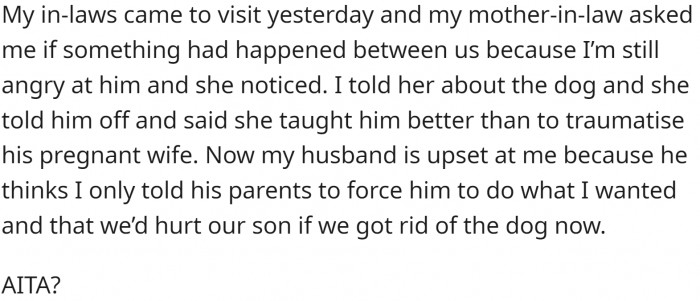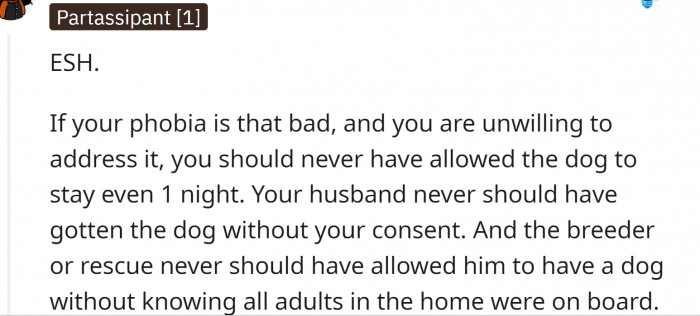Woman Wants To Get Rid Of Her Son's Dog Because She Is Terrified
Some people are terrified of dogs, and they have different reasons for their fear. Some have witnessed an attack or have been attacked.
Some grew up next to aggressive dogs and were constantly scared, even though they were never attacked. On the other hand, some people can’t explain their fear; it is just there.
Just as some of us are afraid of heights or spiders, fear of dogs is a real phenomenon, no matter how much dog lovers try to deny it.
They often forget that dogs are animals – they have little inhibition and act mostly on instinct. The most important part is that they are always equipped with a weapon – their jaws.
Even a tiny poodle can inflict some damage. The only reason they do not enforce their physical supremacy is that they are much better than people.
They are kind, loving, and loyal, which makes us forget that they are powerful animals.
But for some people, all they can see is their power and the ability to inflict harm. One Redditor posted a question: “AITA for telling my husband to get rid of our son’s dog?”
“I’ve been terrified of dogs since I was young. My husband knew, but I don’t think he realized how bad it was until recently.
He got our son a dog, and at first, I was angry, but he promised it wouldn’t come near me, and our son was really happy, so I agreed they could keep it as long as it was kept away from me.”
Naturally, it was a promise impossible to keep.
OP asks:

She is terrified of dogs, but her husband got one for their kid without asking her anyway. He promised he wouldn't let it go near her.

It was a promise impossible to keep. And, of course, on one occasion, the dog managed to come inside, freaking OP out. She now wants the dog out.

Fear of dogs, or cynophobia, is a specific phobia that can severely impact daily life. According to research published in the Journal of Anxiety Disorders, phobias often stem from traumatic experiences or learned behaviors during childhood.
For those who have never been attacked, the fear may develop from observing aggressive dogs or hearing negative stories. Understanding these roots can help individuals confront their fears more effectively.
Exposure therapy is another effective method for treating cynophobia. Trauma specialists recommend starting with gradual exposure, such as looking at pictures of dogs, before moving on to real-life interactions.
This step-by-step approach helps desensitize individuals and build confidence. According to studies from the National Institute of Mental Health, consistent practice in a safe environment can lead to significant reductions in fear responses over time.
Understanding Fear and Anxiety
Dr. Mark Thompson, a clinical psychologist at Stanford, explains that fear of dogs can stem from past traumatic experiences or learned behavior.
His research shows that phobias often develop as a protective mechanism, where the brain associates certain triggers with danger.
This can lead to heightened anxiety around situations that remind individuals of their fears.
Her husband doesn't want to get rid of the dog because their son got attached to it.

OP's in-laws noticed that something is off. Once OP informed them of the issue, they sided with her, further irritating her husband.

Fear is not something you can control consciously. OP should have been adamant when the dog arrived.

The Role of Cognitive Behavioral Therapy
Cognitive Behavioral Therapy (CBT) is a proven approach for treating specific phobias. Dr. David Barlow, a prominent psychologist, emphasizes in his research that CBT helps individuals reframe negative thoughts associated with their fears.
By gradually exposing individuals to their fears in a controlled environment, CBT can reduce anxiety and improve coping strategies. This method enables people to confront their irrational beliefs about dogs, fostering a healthier mindset over time.
Behavioral studies indicate that gradual exposure is an effective method for overcoming phobias.
This technique, known as systematic desensitization, helps individuals confront their fears in a controlled and manageable way.
By gradually increasing exposure to the feared object, individuals can learn to regulate their anxiety responses effectively.
Now her kid and the dog will suffer.

No communication, and the least guilty parties are the ones who suffer.

OP tried to compromise, but she knew she couldn't.

Research indicates that social support can significantly reduce anxiety surrounding phobias. Dr. Susan David, an emotional agility expert, states, "Having a strong support system allows individuals to confront their fears more effectively." You can find more about her insights on her professional website, susandavid.com. Encouraging open discussions about fears with family and friends can create a sense of safety, making it easier to tackle anxiety-provoking situations. This communal approach fosters resilience and encourages gradual exposure.
The Importance of Support Systems
Having a supportive environment is crucial for individuals dealing with phobias or anxiety disorders.
Research emphasizes that a strong support system can provide the encouragement needed to face fears and develop coping strategies.
Family members and friends can play a vital role in this healing process.
Most people keep their dogs inside. Expecting that a dog will somehow never go in to check it out was unreasonable.

Dogs love to explore.

It was a poor compromise.

Understanding Fear Responses
The fight-or-flight response plays a crucial role in how fear manifests. According to Dr. Joseph LeDoux, a neuroscientist at NYU, our brains trigger this response automatically when confronted with perceived threats.
Understanding this physiological reaction can help individuals recognize that their fear of dogs is a natural survival mechanism. By acknowledging these instincts, individuals can work toward managing their fear rather than avoiding it altogether.
Understanding the psychological underpinnings of fear can be empowering.
Studies show that when individuals recognize the irrational nature of their fears, they can begin to challenge and change their responses.
This cognitive reframing can lead to more adaptive coping mechanisms.
So many unclear things in this story:

The bottom line is: "There is no way someone can live with a dog and not come near it."

So many mistakes here. OP shouldn’t have allowed that dog to enter their family in the first place.
Her husband’s promise was impossible to keep. There is no way someone can live with a dog and not come near it.
Now, her son is attached to that poor pup, and they will be the victims here, completely undeserved.
Psychological Analysis
This situation highlights the complexities of fear responses and the importance of understanding one's triggers. It's essential for individuals to seek support and explore therapeutic options that can help them manage their fears in a constructive way.
Analysis generated by AI
Analysis & Alternative Approaches
Phobias like fear of dogs are well-studied in psychology, with effective treatment strategies available for those willing to confront their fears.
Establishing a supportive environment and employing gradual exposure techniques can significantly improve outcomes for individuals struggling with these issues.
Fear of dogs, while deeply rooted, can be effectively managed with the right strategies. Research from the National Institute of Mental Health shows that gradual exposure, cognitive reframing, and social support can significantly alleviate phobic reactions.
Employing techniques like Cognitive Behavioral Therapy and engaging in supportive discussions with loved ones can foster a healthier relationship with fear. Ultimately, understanding the psychological underpinnings of cynophobia can pave the way for healing and positive interactions with dogs.



